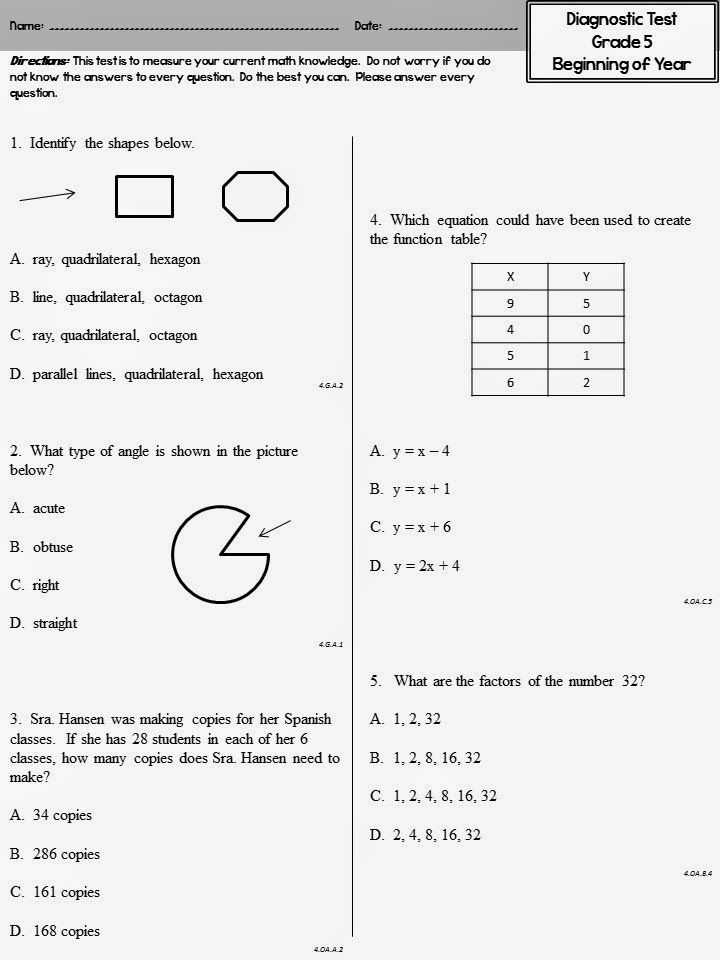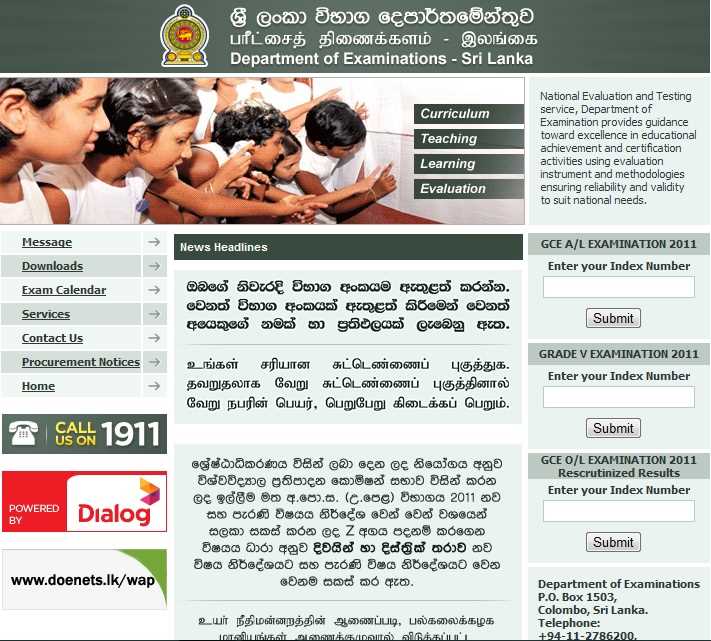
Grade 5 exam is a standardized test that evaluates the knowledge and skills of students at the fifth grade level. It is an important milestone in a student’s academic journey, as it assesses their understanding and application of various subjects such as mathematics, language arts, science, and social studies.
The grade 5 exam is designed to test students’ comprehension and critical thinking abilities. It includes a combination of multiple-choice questions, short answer questions, and problem-solving tasks. The exam aims to measure students’ knowledge, reasoning skills, and ability to apply what they have learned in different contexts.
The grade 5 exam is typically administered towards the end of the school year to assess students’ progress and readiness for the next academic level. It provides valuable insights into each student’s strengths and weaknesses, allowing educators to tailor their instruction and provide targeted support where needed. Additionally, the exam results are often used as a benchmark to compare students’ performance within the school, district, or even at a national level.
Preparing for the grade 5 exam requires diligent studying and practice. Students are encouraged to review key concepts, complete practice tests, and seek help from their teachers or tutors if needed. It is crucial for students to develop good study habits, manage their time effectively, and approach the exam with confidence and a positive attitude.
What Is a Grade 5 Exam?
In grade 5, students typically take exams that evaluate their knowledge and skills across various subjects. These exams are designed to assess their understanding, application, and mastery of the material taught throughout the year. Grade 5 exams cover subjects such as mathematics, science, English, social studies, and sometimes foreign languages.
Mathematics exams in grade 5 often include topics such as addition, subtraction, multiplication, division, fractions, decimals, measurement, geometry, and basic algebra. Students are tested on their ability to solve problems, apply mathematical concepts, and show their work. Science exams cover areas like the scientific method, ecosystems, physical forces, matter, energy, and life cycles. Students are expected to demonstrate their understanding of scientific concepts and their ability to perform experiments and analyze data.
- English exams assess students’ reading comprehension, grammar, vocabulary, and writing skills. Students may be asked to read passages, answer questions about the text, identify literary devices, and write essays or short responses.
- Social studies exams cover topics such as history, geography, civics, and economics. Students are required to learn about different cultures, historical events, government systems, and economic principles. They may be tested through multiple-choice questions, essays, or map interpretation.
- In some schools, grade 5 students also have foreign language exams. These exams assess their ability to speak, read, write, and understand the foreign language they are learning. Students may be tested on vocabulary, grammar, pronunciation, and comprehension.
Overall, grade 5 exams play a crucial role in evaluating students’ academic progress and determining their readiness for the next grade level. These exams help teachers and parents identify areas where students may need additional support and provide an opportunity for students to demonstrate their knowledge and skills in various subjects.
Understanding the Purpose and Format
When preparing for a Grade 5 exam, it is essential to have a clear understanding of the purpose and format of the exam. By knowing what to expect, students can better prepare and perform well on the test.
The purpose of a Grade 5 exam is to assess a student’s knowledge and skills in various subjects, including mathematics, language arts, science, and social studies. This exam serves as an evaluation tool for teachers to gauge the progress and understanding of their students. It also helps identify areas where students may need additional support or intervention.
The format of a Grade 5 exam can vary depending on the school or educational institution. However, it typically consists of multiple-choice questions, short answer questions, and sometimes, essay questions. The exam may also include practical or hands-on tasks, where students are required to apply their knowledge and skills to real-life situations.
It is important for students to familiarize themselves with the format of the exam, as it can impact their approach to studying and answering questions. By practicing different types of questions and becoming comfortable with the exam format, students can improve their confidence and performance on the day of the exam.
Overall, understanding the purpose and format of a Grade 5 exam is crucial for students to effectively prepare and excel in their assessments. By knowing what to expect, students can tailor their study strategies and approach the exam with confidence.
Preparing for a Grade 5 Exam
Preparing for a Grade 5 exam can be a challenging task, but with the right approach and techniques, it can become an opportunity for growth and success. One of the key aspects of exam preparation is creating a study schedule. This schedule should be realistic and manageable, allowing enough time for each subject to be covered thoroughly. It is important to allocate time for review and practice as well, to ensure that the knowledge is solidified and retained.
Organization is another crucial element in exam preparation. It is essential to gather all the necessary study materials, such as textbooks, class notes, and any supplementary resources. Creating an organized and clutter-free study space can also enhance focus and concentration. Using tools like colored sticky notes or flashcards can be helpful in summarizing important information and making it easier to revise.
Active learning strategies should be employed to engage the mind and facilitate better understanding and retention of the material. These can include techniques such as summarizing concepts in one’s own words, creating diagrams or visual representations, and teaching the material to someone else. Utilizing online resources and interactive learning platforms can also make studying more interactive and enjoyable.
Practice is key when it comes to exam preparation. It is important to solve past exam papers or practice questions to familiarize oneself with the exam format and identify areas of weakness that need to be addressed. Timing oneself during practice can also help in managing time effectively during the actual exam. Seeking feedback from teachers or peers on practice papers can provide valuable insights and improve performance.
In conclusion, preparing for a Grade 5 exam requires a combination of effective study strategies, organization, active learning, and practice. By adopting a systematic and structured approach, students can feel more confident and well-prepared for their exams.
Tips and Resources for Successful Study
Studying can sometimes feel overwhelming, but with the right tips and resources, you can make the most out of your study sessions. Here are some strategies to help you study effectively and achieve success in your exams.
1. Create a study schedule: Planning ahead and creating a study schedule can help you manage your time effectively. Determine specific time slots for studying each subject, and stick to your schedule to ensure consistency.
2. Use effective study techniques:
- Practice active learning: Instead of passively reading through your notes, engage with the material by summarizing, asking questions, and discussing concepts with classmates.
- Break it down: Break down larger topics into smaller, manageable parts. This will make it easier to understand and remember the information.
- Use mnemonic devices: Mnemonic devices, such as acronyms or rhymes, can help you remember and recall information more easily.
- Utilize visual aids: Visual aids, such as charts, diagrams, and flashcards, can be effective tools for visual learners to understand and remember information.
3. Seek additional resources: Aside from your textbook, seek out additional resources to supplement your learning. Online tutorials, educational videos, and practice tests can provide different perspectives and help reinforce your understanding of the subject matter.
4. Create a conducive study environment: Find a quiet and well-lit space where you can focus without distractions. Keep your study area organized and free from clutter to help improve concentration and productivity.
5. Take care of yourself: Remember to prioritize self-care during your study sessions. Get enough sleep, eat nutritious meals, and take regular breaks to recharge your mind and prevent fatigue.
By implementing these tips and utilizing the available resources, you can enhance your study skills and increase your chances of achieving success in your exams. Remember to stay consistent, stay motivated, and have confidence in your abilities.
Subjects Covered in a Grade 5 Exam
In a grade 5 exam, students are assessed on a range of subjects that are crucial for their academic development and overall learning. These subjects help build a strong foundation and provide students with essential knowledge and skills for their future education.
One of the core subjects covered in a grade 5 exam is Mathematics. This subject focuses on developing numerical skills, problem-solving abilities, and logical thinking. Students learn various topics such as arithmetic, geometry, fractions, decimals, and measurement. They are tested on their understanding, application, and problem-solving skills in these areas.
Another important subject is English Language Arts. This subject involves reading comprehension, grammar, vocabulary, and writing skills. Students are expected to demonstrate their ability to read and understand different types of texts, analyze literary elements, use correct grammar and punctuation, expand their vocabulary, and write coherent and well-structured compositions.
In addition to Mathematics and English Language Arts, a grade 5 exam also typically covers Science. This subject introduces students to various scientific concepts and principles. They learn about topics such as plants, animals, ecosystems, matter, energy, forces, and the scientific method. Students are assessed on their ability to apply scientific knowledge, conduct experiments, make observations, and draw conclusions based on evidence.
Social Studies is another subject included in a grade 5 exam. This subject focuses on the study of human society, culture, and geography. Students learn about different regions, countries, historical events, government systems, and cultural diversity. They are tested on their understanding of historical and geographical concepts, the ability to analyze maps and timelines, and the comprehension of social, economic, and political structures.
Lastly, Physical Education is an important subject for overall development and well-being. Students are assessed on their physical fitness, coordination, and sportsmanship. They participate in activities that promote physical health, such as team sports, individual sports, and fitness exercises. They may be tested on their ability to perform specific skills, understand the rules of different sports, and demonstrate good sportsmanship.
Overall, a grade 5 exam covers a wide range of subjects that aim to develop students’ knowledge, skills, and abilities in areas such as Mathematics, English Language Arts, Science, Social Studies, and Physical Education. These subjects provide a well-rounded education and prepare students for further academic challenges.
An Overview of the Core Content Areas

In the Grade 5 exam, students are assessed across several core content areas that are crucial for their academic development. These content areas include Mathematics, English Language Arts, Science, and Social Studies. Each subject focuses on different skills and knowledge, ensuring that students receive a comprehensive education across various disciplines.
Mathematics:
Mathematics is an essential subject in Grade 5 as it builds upon the foundational concepts and introduces more complex skills. Students are expected to demonstrate proficiency in operations with whole numbers, fractions, and decimals. They should be able to understand and apply concepts of geometry, measurement, and data analysis. Additionally, students should develop problem-solving and critical thinking skills to solve mathematical problems in different real-life contexts.
English Language Arts:
English Language Arts covers various aspects of language and literacy, including reading, writing, speaking, and listening. In Grade 5, students are expected to read and comprehend different types of texts independently, analyzing their content and identifying main ideas and supporting details. They should be able to write clearly and effectively, using proper grammar, punctuation, and sentence structure. Additionally, students should develop their oral communication skills, including the ability to express their thoughts and ideas confidently and respectfully.
Science:
In the Science curriculum, students explore the natural world and develop an understanding of scientific concepts and processes. Grade 5 focuses on topics such as the states of matter, energy, forces and motion, weather and climate, and ecosystems. Students are expected to demonstrate knowledge of these topics, understand scientific investigation methods, and interpret scientific data. They should also develop critical thinking skills to analyze and evaluate scientific information and make connections between different scientific concepts.
Social Studies:
Social Studies provides students with a comprehensive understanding of history, geography, civics, and economics. Grade 5 emphasizes the study of American history, including the colonization, the American Revolution, the Civil War, and the development of the United States as a global power. Students should be able to analyze primary and secondary sources, understand key historical events and figures, and make connections between the past and the present. Additionally, students should develop an understanding of geography, including physical and human features, and understand the principles of government and the economy.
Common Challenges Students Face
Getting good grades in school is a challenge for many students. There are several reasons why students struggle to achieve high grades. One common challenge is a lack of organization and time management skills. As students advance in their studies, they are expected to keep track of multiple assignments, deadlines, and exams. Without proper organization, it becomes difficult to prioritize tasks and allocate sufficient time for studying. Consequently, students may find themselves overwhelmed and unable to perform at their best.
Another challenge students face is difficulty with understanding and retaining information. Each subject requires a different set of skills and knowledge, and students may find it challenging to comprehend complex concepts. This can lead to frustration and a lack of motivation to study. Additionally, students may struggle with retaining information for long periods of time, which can make it challenging to prepare for exams.
Furthermore, many students face distractions and lack of focus. With the constant connectivity of technology, students are easily tempted to spend their time on social media or entertainment instead of studying. This lack of focus can significantly impact their ability to concentrate during class and complete assignments with a high level of accuracy. As a result, students may find it difficult to grasp new concepts and perform well on exams.
Moreover, test anxiety is a common challenge faced by students. The pressure to perform well can cause students to become anxious and stressed during exams. This can negatively impact their ability to recall information and perform to the best of their abilities. Test anxiety can also lead to a lack of confidence and a fear of failure, which further hinders academic success.
In conclusion, students face various challenges that can impact their academic performance. These challenges include a lack of organization and time management skills, difficulty with understanding and retaining information, distractions and lack of focus, and test anxiety. It is important for students to develop strategies to overcome these challenges in order to achieve their full potential in school.
Identifying and Overcoming Obstacles
Throughout the Grade 5 exam, students may encounter various obstacles that can hinder their progress and success. These obstacles can include difficulty understanding the questions, time constraints, and test anxiety. However, with awareness and the right strategies, students can overcome these obstacles and perform to the best of their abilities.
Identifying Obstacles:
One of the first steps in overcoming obstacles is to identify them. For instance, some students may struggle with comprehending complex instructions, while others may find it challenging to manage their time effectively during the exam. Additionally, test anxiety can cause students to feel overwhelmed and unable to focus during the test. By recognizing these obstacles, students can start addressing them head-on.
Overcoming Obstacles:

Once the obstacles are identified, students can employ various strategies to overcome them. For instance, if understanding the questions is an issue, students can read through the instructions multiple times, underline key phrases, and break down complex questions into smaller parts. Creating a study schedule and practicing time management techniques can help students better manage their time during the exam. To tackle test anxiety, students can practice relaxation techniques such as deep breathing exercises and positive self-talk to calm their nerves and maintain focus.
Conclusion:

Identifying and overcoming obstacles is an essential skill for students to develop, not only for the Grade 5 exam but also for future challenges they may encounter in their academic journey. By recognizing the obstacles they face and implementing effective strategies, students can approach the exam with confidence, perform at their best, and achieve their desired results.